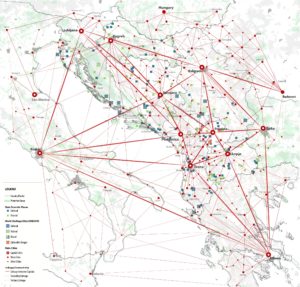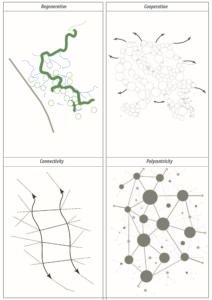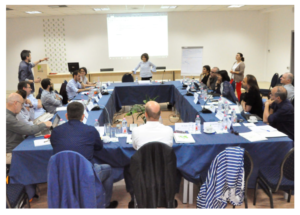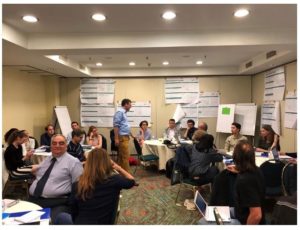The countries of the Western Balkan region – Albania, Bosnia and Herzegovina, Kosovo*[1], North Macedonia, Montenegro, and Serbia – share a common aspiration for a future within the European Union, despite their diversity and idiosyncrasies[2]. That said, the territorial and political complexities of this region of nearly 20 million inhabitants, render the translation of EU policies to practice, rather challenging. Addedly, as most researchers and civil society organisations in the Western Balkans would argue[3], the societal involvement in this process of convergence is rather insipid. Be that as it may, the Western Balkans diverse as it is, can only thrive through cooperation between places, actors and institutions[4].

Regenerative Western Balkans – WB Visioning Territorial Futures, Skopje, North Macedonia, 30-31 May, 2019
Establishment of the TG-WeB
On December 2017, a group of European researchers and academics at the Politecnico di Torino, Italy, initiated a discourse on territorial governance in the Western Balkans, inspired also by the work of AESOP thematic group on Transboundary Spaces, Policy Diffusion and Planning Cultures. A year later, in 2018, some of these researchers, together with civil society organisations from the Western Balkan and EU countries carried on the discourse in Tirana, Albania, and subsequently established the Western Balkan Network on Territorial Governance (TG-WeB).
TG-WeB was conceived as a voluntary, non-project-based platform of bottom-up cooperation of civil society, research and academia actors in Europe, with the mission to catalyse changes towards innovation on better territorial governance for the Western Balkan, in line with its EU integration ambitions and Europeanisation processes.
With members ranging from both the region and EU member countries, the network accentuates territorial knowledge, connectivity and continuities that are often overlooked in the political processes undertaken by the EU and the Western Balkan governments. As a matter of fact, in such a diverse Europe, integration is fundamentally societal and it is a mutual process between aspiring and welcoming communities, where the former must meet requirements and the latter must recognize the local challenges of integration, both cooperating towards the common goal of territorial development.

Visioning Territorial Futures
EU Integration and Territorial Governance
Our [TG-WeB] purpose is indeed to advocate across the region for enhanced domestic territorial governance and influence the EU integration process of the region from a territorial governance perspective. Thus, addressing or voicing challenges of poor and unethical administration of resources, inadequate spatial planning, non-inclusive policy-making, territorial disparities, and conflicting priorities of sectorial silos, stand at the core of the research and advocacy efforts of the network members.
Each year, at the network’s annual workshop, the members share and exchange state-of-the-art knowledge on territorial governance for the Western Balkans, draft policy contributions which are further shared with domestic policy actors and relevant EU institutions, as well as streamline new ideas for research and publication to pursue during the year. The annual workshops are hosted by the network member organisations – in turns, having started in Tirana, then Skopje, Belgrade and most recently in Ljubljana. Recently TG-WeB has advocated for the involvement of the Western Balkans in the implementation of the EU Territorial Agenda 2030, and to this end, has shared the position of the network on this regard with the Slovenian Ministry of Environment and Spatial Planning, in the frame of the 2021 Slovenian Presidency of the Council of the European Union. TG-WeB promotes the extension of the Territorial Agenda 2030 implementation in the Western Balkan region, as a critical step towards EU integration and Europeanisation of territorial development. The Ministry included and presented the position of the network as a special point in the agenda of the 1st meeting of the Territorial Agenda Working Group and additionally shared it with the NTCCPs for their further consideration.
Today, TG-WeB brings together 21 member organisations and 12 individual members from the Western Balkan countries and Bulgaria, Croatia, Greece, Hungary, Italy, Luxembourg, Slovakia, and Slovenia. As a network, we are always pleased and eager to get together and explore avenues for knowledge-making and policy advocacy, trying also to overcome perceptual or real barriers to cooperation in the region.


TG-WeB Annual Workshops

Dr. Rudina Toto (Email; Website) is senior expert in territorial governance and environmental planning, at Co-PLAN, Institute for Habitat Development Albania. She teaches at POLIS University, Tirana, and is active in the Western Balkans particularly through her engagement with the TG-WeB. She has extensive hands-on experience in urban, regional, and disaster risk reduction planning, and has co-authored the planning legislation in Albania from 2010 to 2016. Her research interests focus on urban commons, particularly public space.
Notes
[1] *This designation is without prejudice to positions on status and is in line with UN Security Council resolution 1244 and the International Court of Justice Opinion on the Kosovo declaration of independence.
[2] http://tg-web.eu/wp-content/uploads/2019/02/TG-WeB_Postion_Paper_On_Territorial-Governance-for-Western-Balkans_October_2018.pdf
[3] See for instance European Western Balkans (2021) (https://europeanwesternbalkans.com/2021/10/18/eu-integration-of-the-western-balkans-is-a-mutually-beneficial-process/) and The Berlin Process: Civil Society Forum of the Western Balkans (2019) (https://berlinprocess.info/op-eds/western-balkan-local-communities-in-the-process-of-european-integration-show-me-that-you-care/).
[4] The EU Economic and Investment Plan for the Western Balkans (COM(2020) 641 final) builds around the moto: “Western Balkans are an integral part of Europe and a geostrategic priority for the European Union” (p.1).
Are you currently involved with regional research, policy, and development? The Regional Studies Association is accepting articles for their online blog. For more information, contact the Blog Editor at rsablog@regionalstudies.org.